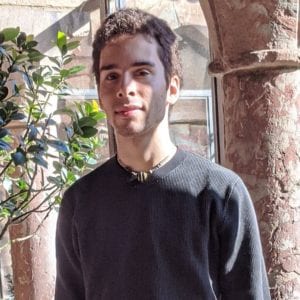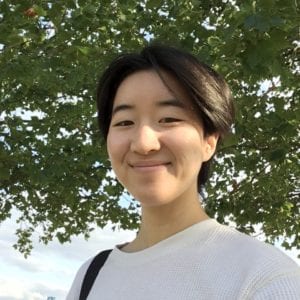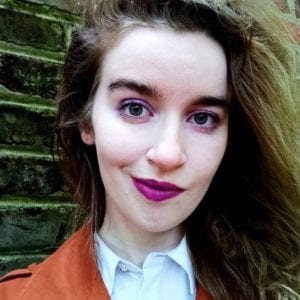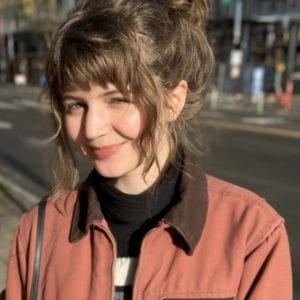Five phenomenal interns—beaming in remotely from coast to coast—have joined the Copper Canyon Press team this fall, and it’s our pleasure to introduce you to each of them here. We’ll share their 60-second Q&As every #MeettheInternMonday for the next five weeks, so check back!
P.S. Interested in an internship with us in spring 2021? Applications are due November 1. Learn more.
Meet Reuben
 CCP: What’s your favorite aspect of the intern experience at Copper Canyon Press so far?
CCP: What’s your favorite aspect of the intern experience at Copper Canyon Press so far?
R: I really get the sense that the staff build genuine friendships between themselves and the poets they publish, and it’s special to be welcomed into such a close-knit community. I look forward to the full staff meeting because not only are we going to discuss how to get the poetry we love out into the world, but we’re going to have fun while doing so — even though we’re meeting remotely.
CCP: Please tell us about a forthcoming Copper Canyon title you’re excited about, and why.
R: I’m thrilled about Kayleb Rae Candrilli’s collection Water I Won’t Touch (April 2021). Candrilli possesses a stunning lyricism and a bracing forthrightness: “We love each other so much / we are trying to keep // this life going / despite all our simultaneous body— // all this ridiculous flesh.” They write about “heavy things”—a hard Appalachian childhood, transphobia, climate change—but they write trans love and queer joy, too, and that’s something I always cherish in a book.
CCP: Please give us a line from a poem that you can’t get out of your head.
R: I’m a musician, and the line “All that glitters isn’t music” from Eduardo C. Corral’s poem “To the Angelbeast” resonates with me in many ways. To give one reading, perhaps Corral means that something that glitters can easily stir up ugly, unmusical emotions; I think of treasure and greed, and my mind goes from “glitter” to “luster,” from “luster” to “lust.” But I also want to invert Corral’s words. Maybe music, at certain moments, can glitter itself.
Meet Phoebe
 CCP: What’s your favorite aspect of the intern experience at Copper Canyon Press so far?
CCP: What’s your favorite aspect of the intern experience at Copper Canyon Press so far?
P: I’ve been thrilled to find that, even with staff dedicated to specific tasks and departments, so much of the work is intersectional. There is something necessary and beautiful about collaborative endeavors, especially at such stretches of physical distance. From grant research to manuscript reviews, the sheer range of work being done at the press has made me cherish the voices and hands that make poetry a shared reality.
CCP: Please tell us about a forthcoming Copper Canyon title you’re excited about, and why.
P: Alex Dimitrov’s collection, Love and Other Poems. I’m enamored of books brave enough to confront cliches. Dimitrov takes the most worn and battered trope—love—and renews it. His poems feel like the exhumation of something you’ve always known but never met, or as he writes: “A long drive toward a remembered place.”
CCP: Please give us a line from a poem that you can’t get out of your head.
P: I have my thumb on this gem from Paige Lewis’s “On the Train, A Man Snatches My Book”: “I’m / the vice president of panic, and the president is / missing.” These lines feel so apt for the moment, vacillating between the personal and collective, vaulting from the scale of interior intimacy to national distress. Yet despite the underlying panic, there is also a tone of gentle absurdity, a promise that poetry offers small but not insignificant pleasures in making sense of our current circumstances.
Meet Zuhra
 CCP: What’s your favorite aspect of the intern experience at Copper Canyon Press so far?
CCP: What’s your favorite aspect of the intern experience at Copper Canyon Press so far?
Z: My favorite aspect of the intern experience at Copper Canyon is being able to dedicate time and space to poetry, whether it is sharing poems at staff meetings or helping the hard-working folks at CCP get it out into the world. What is great about CCP is that everyone really trusts and values what you have to offer. I feel honored to have the opportunity to assist the Press in specific and meaningful ways.
CCP: Please tell us about a forthcoming Copper Canyon title you’re excited about, and why.
Z: The Essential June Jordan (spring 2021). I first encountered June Jordan when a mentor sent me an excerpt from “Poem about My Rights.” It was the line “I am not wrong: Wrong is not my name / My name is my own my own my own.” These two lines had such a profound impact on me that I immediately looked up the rest of the poem and cried profusely upon finishing. The forthright defiance with which Jordan ends the poem was exactly what I needed to begin to take my own set of terms and conditions, so to speak, seriously.
CCP: Please give us a line from a poem that you can’t get out of your head.
Z: This excerpt from “Birds Hover the Trampled Field” by Richard Siken: “Something’s not / right about what I’m doing but I’m still doing it— / living in the worst parts, ruining myself.” I think about these two lines specifically in relation to mental health. There is something devastating about knowing you are not “okay” but also not being able to change or immediately put a stop to whatever it is that is wrong. I strongly resonate with these lines and return to them when I find myself in ruin.
Meet Kathryn
 CCP: What’s your favorite aspect of the intern experience at Copper Canyon Press so far?
CCP: What’s your favorite aspect of the intern experience at Copper Canyon Press so far?
K: As the marketing intern, I’ve been able to see firsthand how much goes into making sure Copper Canyon books find their readers, from pitching to book clubs and podcasts to corresponding with academics about bringing poetry to classrooms to creating the new sales catalog with my fellow interns. There’s such a wide range of work happening at the Press, and the fact we are trusted and encouraged to contribute to it all is definitely my favorite thing about interning.
CCP: Please tell us about a forthcoming Copper Canyon title you’re excited about, and why.
K: I can’t wait for Erin Belieu’s Come-Hither Honeycomb (February 2021) to hit shelves everywhere. In the collection, Belieu balances vulnerability and agency with a deft hand that encourages readers to break free of painful patterns and relationships in their own lives. Furthermore, the focus of the book on the lasting effects of trauma is something that is incredibly important to me, and something I know will resonate with a lot of readers out there.
CCP: Please give us a line from a poem that you can’t get out of your head.
K: I’ve come back to Joy Harjo’s work more times than I can count, but the lines “If I think behind me, I might break. / If I think forward, I lose now.” from her poem “Fall Song” have been pounding in my ears lately. Those lines remind me to pause and reflect as I try to take stock of a world that’s constantly changing but not to get stuck in the reverie for too long.
Meet Julia
 CCP: What’s your favorite aspect of the intern experience at Copper Canyon Press so far?
CCP: What’s your favorite aspect of the intern experience at Copper Canyon Press so far?
J: I’m moved by the generosity of the staff—their willingness to share their knowledge and experiences with interns as well as their openness to our own ideas. I appreciate that we are encouraged to get involved across all areas of the Press, and as the production intern, I value the insight I’ve gained into the stages of the book production process, from copyediting to design. It feels incredibly rewarding to honor a poet’s work by helping to realize a finished book.
CCP: Please tell us about a forthcoming Copper Canyon title you’re excited about, and why.
J: I’m so excited for people to read Nikki Wallschlaeger’s Waterbaby, which will be published in spring 2021. I am in awe of the way Wallschlaeger channels exhaustion as power, through poems that range from brilliantly wry to rending: “I drag my body around lovingly but / it still won’t let me go.” Her voice is untiring and raging, and sings with an extraordinary capacity for love.
CCP: Please give us a line from a poem that you can’t get out of your head.
J: I’ve been turning to these lines from Jean Valentine’s “Sanctuary”: “Yes I know: the thread you have to keep finding, over again, to / follow it back to life; I know. Impossible, sometimes.” Often, poetry has been this thread for me.